Fran Baker's Blog, page 16
May 21, 2012
Monday, May 21, 1934
Walked to school and home with Ruth Ray. Nadine and Pauline didn't go. Went with Daddy to a job.
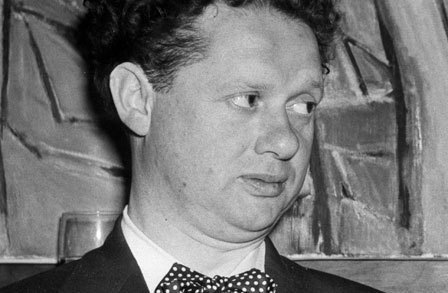 Dylan Thomas (1914 - 1953)
Dylan Thomas (1914 - 1953)
Thomas began writing poetry as a child, publishing his work in school magazines. By 1930 he had taken to writing poems in penny notebooks; a number of his poems were published in the "Poet's Corner" of the Sunday Referee and in the influential New Verse. Ralph Maud, in Entrances to Dylan Thomas's Poetry, declared that the writer's first published poem was the subsequently popular "And death shall have no dominion," which appeared on May 8, 1933, in the New English Weekly.
The notebooks in which Thomas composed between 1930 and 1934, when he was sixteen to twenty years old, reveal the young poet's struggle with a number of personal crises, the origins of which are rather obscure. In his 1965 Dylan Thomas, Jacob Korg described them as "related to love affairs, to industrial civilization, and to the youthful problems of finding one's identity." Revised versions of some of the notebooks' poems became in 1934 his first published volume of poetry, Eighteen Poems.

 Dylan Thomas (1914 - 1953)
Dylan Thomas (1914 - 1953)Thomas began writing poetry as a child, publishing his work in school magazines. By 1930 he had taken to writing poems in penny notebooks; a number of his poems were published in the "Poet's Corner" of the Sunday Referee and in the influential New Verse. Ralph Maud, in Entrances to Dylan Thomas's Poetry, declared that the writer's first published poem was the subsequently popular "And death shall have no dominion," which appeared on May 8, 1933, in the New English Weekly.
The notebooks in which Thomas composed between 1930 and 1934, when he was sixteen to twenty years old, reveal the young poet's struggle with a number of personal crises, the origins of which are rather obscure. In his 1965 Dylan Thomas, Jacob Korg described them as "related to love affairs, to industrial civilization, and to the youthful problems of finding one's identity." Revised versions of some of the notebooks' poems became in 1934 his first published volume of poetry, Eighteen Poems.
Published on May 21, 2012 05:14
May 20, 2012
Sunday, May 20, 1934
Daddy went fishing early this morning with some men. Mother and I didn't go to Sunday school or church.
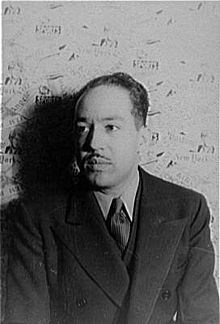 James Mercer Langston Hughes (February 1, 1902 – May 22, 1967)
James Mercer Langston Hughes (February 1, 1902 – May 22, 1967)
Born in Joplin, Missouri, Hughes was an American poet, social activist, novelist, playwright,
and columnist. He was one of the earliest innovators of the then-new literary art form jazz poetry.
Hughes is best known for his work during the Harlem Renaissance. He famously wrote about
the period that "the negro was in vogue" which was later paraphrased as "when Harlem was in vogue"
Throughout his career, Hughes received numerous honors and awards. He died in New York
City of complications following surgery for prostate cancer. Yale University holds the Langston
Hughes papers. 2002 The United States Postal Service added the image of Langston Hughes to
its Black Heritage series of postage stamps.

 James Mercer Langston Hughes (February 1, 1902 – May 22, 1967)
James Mercer Langston Hughes (February 1, 1902 – May 22, 1967) Born in Joplin, Missouri, Hughes was an American poet, social activist, novelist, playwright,
and columnist. He was one of the earliest innovators of the then-new literary art form jazz poetry.
Hughes is best known for his work during the Harlem Renaissance. He famously wrote about
the period that "the negro was in vogue" which was later paraphrased as "when Harlem was in vogue"
Throughout his career, Hughes received numerous honors and awards. He died in New York
City of complications following surgery for prostate cancer. Yale University holds the Langston
Hughes papers. 2002 The United States Postal Service added the image of Langston Hughes to
its Black Heritage series of postage stamps.
Published on May 20, 2012 04:45
May 19, 2012
Saturday, May 19, 1934
Nadine came down and we went out to Swope. Rode home with Daddy. Nadine, Gweyn and I went to the Fashion Show.
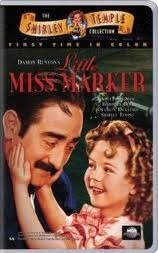 Little Miss Marker
Little Miss Marker
Starring Shirley Temple, Adolphe Menjou, Dorothy Dell and Charles Bickford
Writers: Damon Runyon and Walter Lipman
Genre: Comedy/Family/Drama
Plot Summary:
Little Martha Jane, aka Little Miss Marker (Temple) is left with the bookmaker Sorrowful Jones by her dad as part of a bet on a horserace. Sorrowful (Menjou) and his group of fellow bookies take to her, reluctantly at first, but their cynical ways start to rub off on her. Will a party set at Camelot bring back her faith in humanity?
 Little Miss Marker
Little Miss MarkerStarring Shirley Temple, Adolphe Menjou, Dorothy Dell and Charles Bickford
Writers: Damon Runyon and Walter Lipman
Genre: Comedy/Family/Drama
Plot Summary:
Little Martha Jane, aka Little Miss Marker (Temple) is left with the bookmaker Sorrowful Jones by her dad as part of a bet on a horserace. Sorrowful (Menjou) and his group of fellow bookies take to her, reluctantly at first, but their cynical ways start to rub off on her. Will a party set at Camelot bring back her faith in humanity?
Published on May 19, 2012 04:45
May 18, 2012
Friday, May 18, 1934
This evening Daddy and Mother and I took Mrs. Richards and Tiny and Louie to Swope Park. Went by Kate's on the way home.
 May 18, 1934 - Academy Award first called Oscar in print by columnist Sidney Skolsky
May 18, 1934 - Academy Award first called Oscar in print by columnist Sidney Skolsky
There are several stories about how "Oscar" got its name.
One story gives credit to the Academy’s executive secretary, Margaret Herrick. The story goes that in
1931, she reportedly saw the statuette, studied it carefully and exclaimed, “Why he looks like my
Uncle Oscar.”
Another is that two-time winner Bette Davis, who was married to Harmon Oscar Nelson, Jr.
nicknamed it for her husband.
Yet another says award-winning actor John Barrymore coined the name.
Regardless, most people give Sidney Skolsky credit for putting "Oscar" in print.

 May 18, 1934 - Academy Award first called Oscar in print by columnist Sidney Skolsky
May 18, 1934 - Academy Award first called Oscar in print by columnist Sidney SkolskyThere are several stories about how "Oscar" got its name.
One story gives credit to the Academy’s executive secretary, Margaret Herrick. The story goes that in
1931, she reportedly saw the statuette, studied it carefully and exclaimed, “Why he looks like my
Uncle Oscar.”
Another is that two-time winner Bette Davis, who was married to Harmon Oscar Nelson, Jr.
nicknamed it for her husband.
Yet another says award-winning actor John Barrymore coined the name.
Regardless, most people give Sidney Skolsky credit for putting "Oscar" in print.
Published on May 18, 2012 04:45
May 17, 2012
Thursday, May 17, 1934
Nadine and Pauline were down. I played tag outside for a while. Did a whole lot of nightwork.
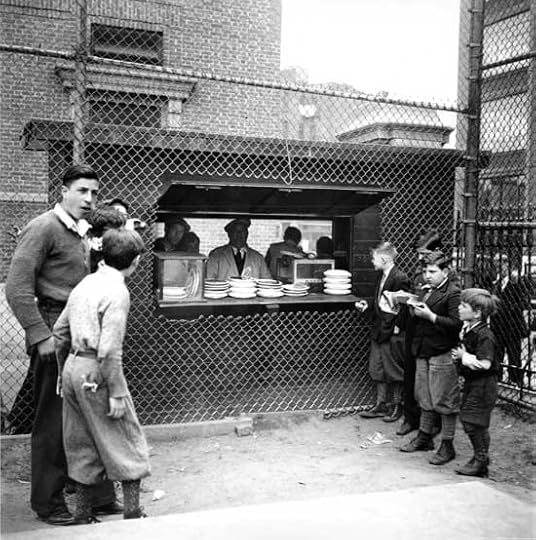 May 17, 1934 - New York City lunch stand
May 17, 1934 - New York City lunch stand
Once the location of the Trinity Church uptown cemetery (until 1896), and today the site of a swing-set in the expanded playground adjacent to Carmine Street Pool, this location for a lunch stand drew upon the predominantly youthful patrons of the park, the pool, and the Hudson Park library branch.

 May 17, 1934 - New York City lunch stand
May 17, 1934 - New York City lunch standOnce the location of the Trinity Church uptown cemetery (until 1896), and today the site of a swing-set in the expanded playground adjacent to Carmine Street Pool, this location for a lunch stand drew upon the predominantly youthful patrons of the park, the pool, and the Hudson Park library branch.
Published on May 17, 2012 04:45
May 16, 2012
Wednesday, May 16, 1934
Skated up to Pauline's but she didn't want to go skating.
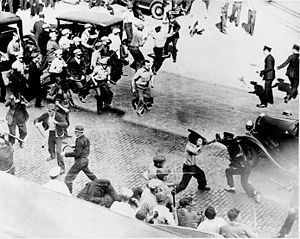 Open battle between striking teamsters armed with pipes and the police in the streets of Minneapolis
Open battle between striking teamsters armed with pipes and the police in the streets of Minneapolis
The Minneapolis General Strike of 1934 grew out of a strike by Teamsters against most of the trucking companies operating in Minneapolis, a major distribution center for the Upper Midwest. The strike began on May 16, 1934 in the Market District (the modern day Warehouse District) and ensuing violence lasted periodically throughout the summer. Led by local leaders associated with the Trotskyist Communist League of America, a group that later founded the Socialist Workers Party (United States), the strike paved the way for the organization of over-the-road drivers and the growth of the Teamsters labor union. It, along with the 1934 West Coast Longshore Strike and the 1934 Toledo Auto-Lite Strike led by the American Workers Party, were also important catalysts for the rise of industrial unionism in the 1930s, much of which was organized through the Congress of Industrial Organizations.

 Open battle between striking teamsters armed with pipes and the police in the streets of Minneapolis
Open battle between striking teamsters armed with pipes and the police in the streets of MinneapolisThe Minneapolis General Strike of 1934 grew out of a strike by Teamsters against most of the trucking companies operating in Minneapolis, a major distribution center for the Upper Midwest. The strike began on May 16, 1934 in the Market District (the modern day Warehouse District) and ensuing violence lasted periodically throughout the summer. Led by local leaders associated with the Trotskyist Communist League of America, a group that later founded the Socialist Workers Party (United States), the strike paved the way for the organization of over-the-road drivers and the growth of the Teamsters labor union. It, along with the 1934 West Coast Longshore Strike and the 1934 Toledo Auto-Lite Strike led by the American Workers Party, were also important catalysts for the rise of industrial unionism in the 1930s, much of which was organized through the Congress of Industrial Organizations.
Published on May 16, 2012 04:45
May 15, 2012
Tuesday, May 15, 1934
Walked to school and home with the kids. Played jacks a little while with Betty. Ruth Ray was down.
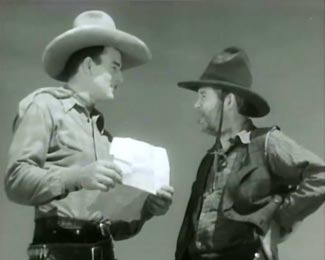 The Man from Utah
The Man from Utah
Released May 15, 1934
Starring John Wayne, Polly Ann Young, George "Gabby" Hayes
Directed by Robert N. Bradbury
Written by Lindsley Parsons
John Wayne is rodeo rider John Weston, who hunts for the killers of rodeo riders before
they can win at a roving rodeo run by outlaws.

 The Man from Utah
The Man from Utah
Released May 15, 1934
Starring John Wayne, Polly Ann Young, George "Gabby" Hayes
Directed by Robert N. Bradbury
Written by Lindsley Parsons
John Wayne is rodeo rider John Weston, who hunts for the killers of rodeo riders before
they can win at a roving rodeo run by outlaws.
Published on May 15, 2012 04:45
May 14, 2012
Monday, May 14, 1934
Walked to school and home with the kids. Daddy got a day job. Mother and I went with him to fix a house at 39th and Garfield.
[image error]"The Adventures of Babe Ruth" radio show - May 14, 1934
The Adventures of Babe Ruth radio show was produced by the NBC Blue Network, which later
became ABC, and was sponsored by Quaker Oats and the U.S. Navy in 1934. As the name
suggests, it described different situations from his career. Each episode was 15 minutes.

[image error]"The Adventures of Babe Ruth" radio show - May 14, 1934
The Adventures of Babe Ruth radio show was produced by the NBC Blue Network, which later
became ABC, and was sponsored by Quaker Oats and the U.S. Navy in 1934. As the name
suggests, it described different situations from his career. Each episode was 15 minutes.
Published on May 14, 2012 04:45
May 13, 2012
Sunday, May 13, 1934
Today was Mother's Day. Went to our Sunday school. Gave Mother her present. Went to a Mother's Day party in the p.m.
 Happy Mother's Day!
Happy Mother's Day!
 Happy Mother's Day!
Happy Mother's Day!
Published on May 13, 2012 04:45
May 12, 2012
Saturday, May 12, 1934
Nadine came down today. She and I went skating for a while. I traded three old magazines for one new and another older one.
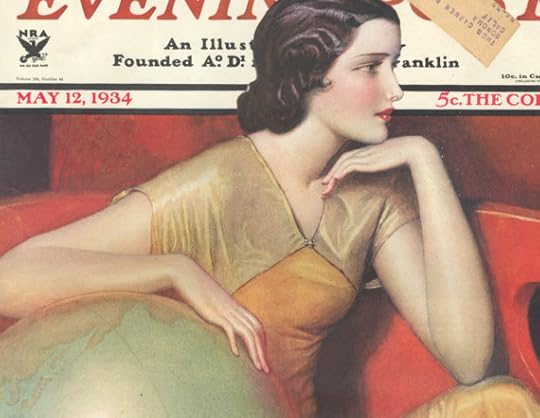 Saturday Evening Post - May 12, 1934
Saturday Evening Post - May 12, 1934
Illustrator: W.T. Benda
Władysław Teodor "W.T." Benda (January 15, 1873 - November 30, 1948) was a Polish-American
painter, illustrator, and designer. Born in Poland, he came to the United States at the very end of the
19th century. He attended the Art Students League of New York and the William Merritt ChaseSchool.
In 1916 he joined the Society of Illustrators and in 1919 became a naturalized citizen. Benda married
Romola Campfield and they had two daughters, Eleanora and Baria, who were both artists.
 Saturday Evening Post - May 12, 1934
Saturday Evening Post - May 12, 1934Illustrator: W.T. Benda
Władysław Teodor "W.T." Benda (January 15, 1873 - November 30, 1948) was a Polish-American
painter, illustrator, and designer. Born in Poland, he came to the United States at the very end of the
19th century. He attended the Art Students League of New York and the William Merritt ChaseSchool.
In 1916 he joined the Society of Illustrators and in 1919 became a naturalized citizen. Benda married
Romola Campfield and they had two daughters, Eleanora and Baria, who were both artists.
Published on May 12, 2012 04:45



